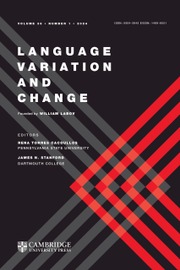Article contents
S marks the spot? Regional variation and early African American correspondence
Published online by Cambridge University Press: 03 May 2005
Abstract
The different population ecologies of slavery-era America necessitate an investigation into the issue of regional variation in Early African American English (AAE). This article addresses this issue through the Ottawa Repository of Early African American Correspondence, a corpus of letters written by semiliterate African American settlers in Liberia between 1834 and 1866. We investigate nonstandard verbal -s and its conditioning by linguistic and social factors, including each writer's regional origin in the United States. Results show that, despite differences in overall rates across regions, the linguistic conditioning largely remains constant. These results suggest that subtle regional distinctions in Early AAE existed when specific settlement and population ecologies encouraged them, but that the shared history and circumstances of language contact and development led to an overall identity of forms and conditioning factors across regional varieties.The data on which this study is based are taken from the Ottawa Repository of Early African American Correspondence (OREAAC; Van Herk & Poplack, 2003), housed in the Sociolinguistics Laboratory at the University of Ottawa. Financial support was provided by the Social Sciences and Humanities Research Council of Canada in the form of a postdoctoral fellowship to the first author. Earlier versions of the analyses reported here were presented at meetings of the American Dialect Society (Chicago, January 2000) and the Canadian Linguistics Association (University of Toronto, June 2002). We thank the audiences at these presentations for their comments and suggestions, and we thank Shana Poplack and two anonymous reviewers for comments on earlier drafts of this paper. Any remaining errors are our own responsibility.
- Type
- Research Article
- Information
- Copyright
- © 2005 Cambridge University Press
References
REFERENCES
- 10
- Cited by


